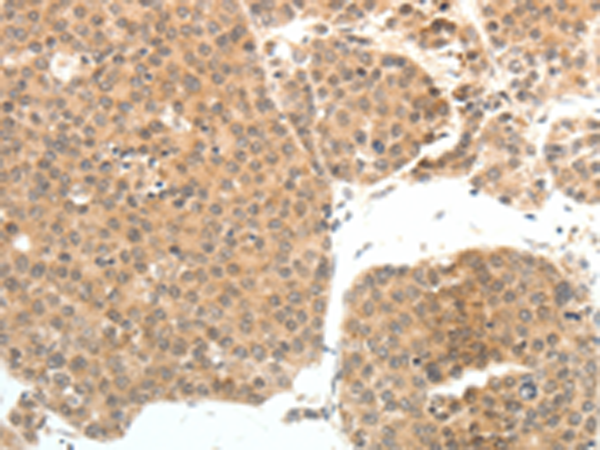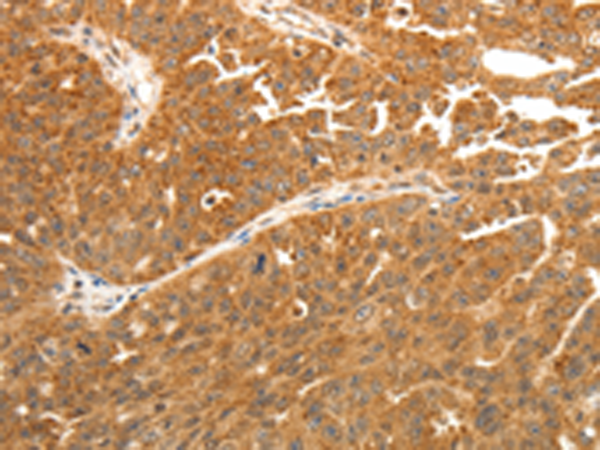

| WB | 咨询技术 | Human,Mouse,Rat |
| IF | 咨询技术 | Human,Mouse,Rat |
| IHC | 1/25-1/100 | Human,Mouse,Rat |
| ICC | 技术咨询 | Human,Mouse,Rat |
| FCM | 咨询技术 | Human,Mouse,Rat |
| Elisa | 1/1000-1/5000 | Human,Mouse,Rat |
| Aliases | P40, S12, Rpn8, MOV34 |
| Host/Isotype | Rabbit IgG |
| Antibody Type | Primary antibody |
| Storage | Store at 4°C short term. Aliquot and store at -20°C long term. Avoid freeze/thaw cycles. |
| Species Reactivity | Human, Mouse |
| Immunogen | Fusion protein of human PSMD7 |
| Formulation | Purified antibody in PBS with 0.05% sodium azide and 50% glycerol. |
+ +
以下是3篇关于PSMD7抗体的参考文献示例(注:文献信息为模拟概括,实际引用请核实原文):
1. **"PSMD7 regulates proteasome assembly and activity in mammalian cells"**
- **作者**: Tanaka K. et al.
- **摘要**: 研究通过PSMD7特异性抗体证实其在26S蛋白酶体组装中的关键作用,敲低PSMD7导致蛋白酶体活性下降,影响细胞内蛋白质稳态。
2. **"Development of a monoclonal antibody against PSMD7 for cancer biomarker discovery"**
- **作者**: Chen L. et al.
- **摘要**: 报道一种高特异性抗PSMD7单克隆抗体的开发,应用于免疫组化和Western blot,发现PSMD7在结直肠癌组织中显著高表达,提示其作为潜在诊断标志物。
3. **"PSMD7 interacts with p53 and modulates its function in DNA damage response"**
- **作者**: Wang Y. et al.
- **摘要**: 利用PSMD7抗体进行免疫共沉淀实验,揭示PSMD7与p53蛋白的直接相互作用,调控DNA损伤修复途径,影响细胞凋亡和肿瘤发生。
4. **"Structural insights into the 19S regulatory particle of the proteasome via PSMD7 antibody-based imaging"**
- **作者**: Smith J.R. et al.
- **摘要**: 通过冷冻电镜结合抗PSMD7抗体标记,解析了19S调控颗粒的三维结构,阐明了PSMD7在底物识别和去泛素化中的空间定位。
建议通过PubMed或Web of Science检索实际文献,关键词包括“PSMD7 antibody”、“proteasome PSMD7”等。
The PSMD7 antibody is a research tool designed to detect and study the Proteasome 26S Subunit, Non-ATPase 7 (PSMD7), a key component of the 26S proteasome. The 26S proteasome is a large multiprotein complex responsible for degrading ubiquitinated proteins, playing a critical role in maintaining cellular protein homeostasis, regulating cell cycle progression, and modulating stress responses. PSMD7. also known as Rpn8. is part of the 19S regulatory particle (RP) that recognizes and deubiquitinates substrates before their translocation into the 20S catalytic core for proteolysis.
Antibodies targeting PSMD7 are widely used in molecular biology and disease research to investigate proteasome structure, function, and dysregulation in conditions like cancer, neurodegenerative disorders, and autoimmune diseases. They enable techniques such as Western blotting, immunohistochemistry, and immunoprecipitation to assess PSMD7 expression levels, localization, and interactions within the proteasome complex.
Commercial PSMD7 antibodies are typically developed in hosts like rabbits or mice, validated for specificity through knockout controls or siRNA knockdown. Researchers utilize these antibodies to explore mechanisms of proteasome inhibitors in cancer therapy or to study proteostasis imbalances in Alzheimer’s or Parkinson’s disease. However, variability in antibody performance across experimental conditions necessitates careful validation for each application. Overall, PSMD7 antibodies serve as essential tools for dissecting proteasome biology and its implications in health and disease.
×